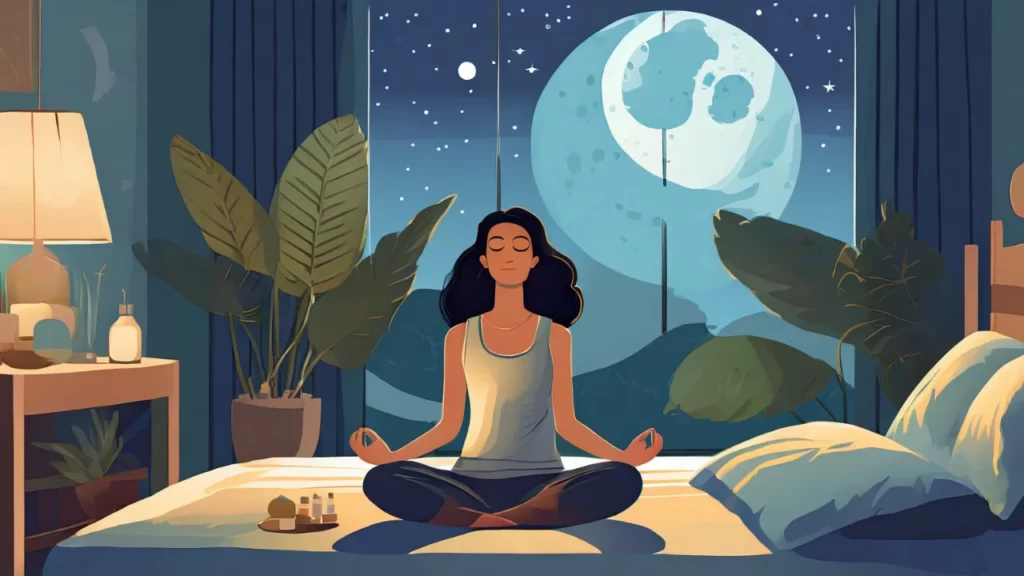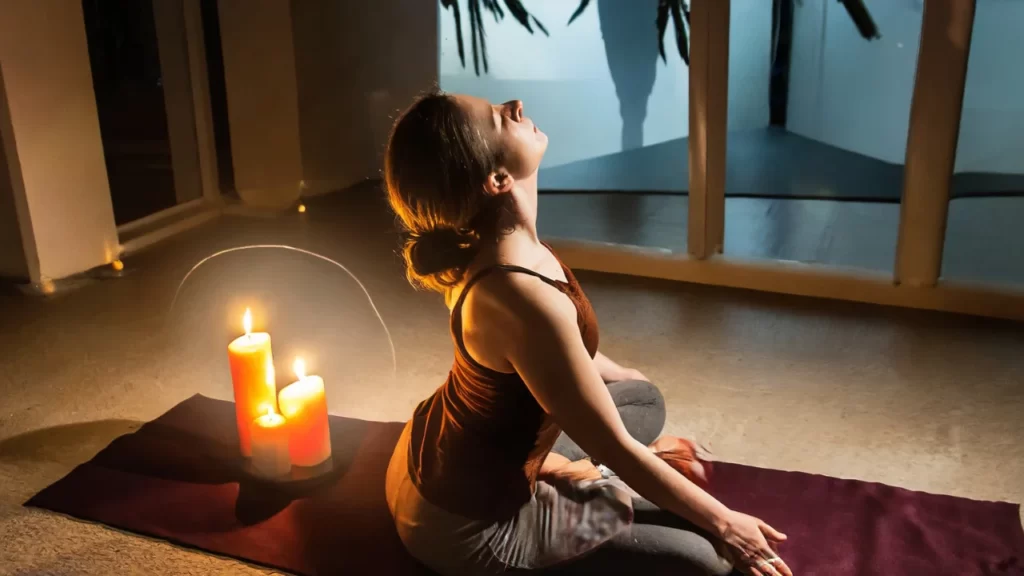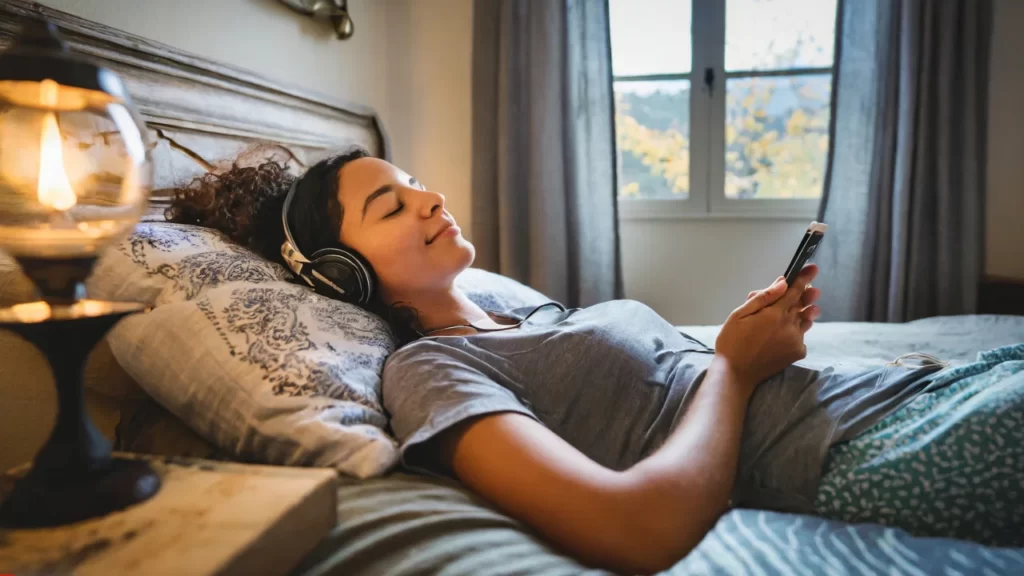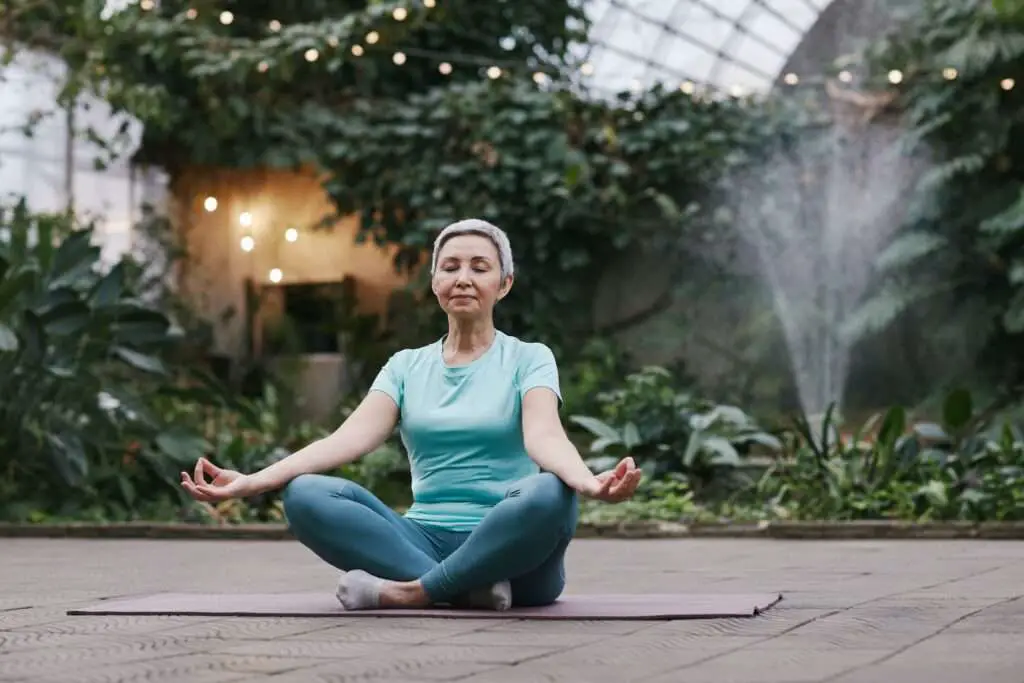7 Guided Meditations to Help You Sleep Better Tonight
Do you toss and turn at night, your mind racing and your body tense, unable to find restful sleep? You’re not alone. Millions of people around the world grapple with sleep issues, yearning for the peaceful embrace of deep slumber.
But hope is not lost! Guided meditation can be a powerful tool to unlock the door to a good night’s sleep. By practicing specific guided meditations designed to promote relaxation and quiet the mind, you can create the perfect conditions for peaceful sleep.
Key Takeaways
- Meditation as a Route to Sound Sleep: Did you know that meditation can be a very effective method for increasing relaxation and improving sleep quality? That is correct!
- Meditations for a Sleep Paradise: Guided meditations, which are specifically designed to help you fall asleep, generate an optimal mentality for comfortable sleep.
- 7 Peaceful Journeys to Slumberland: Fall off into a peaceful sleep with seven guided meditations designed to soothe your mind and body.
- Deeper Sleep: By including these meditations into your nightly routine, you can sleep deeper and wake up feeling refreshed and energised.
- The Gift of Sleep: Try these guided meditations tonight to give yourself the gift of greater sleep. Accept the peace and wake up ready to face the day!

The Power of Meditation for Sleep
If you struggle with falling asleep or staying asleep at night, you’re not alone. According to the National Sleep Foundation, 50 to 70 million adults in the United States experience sleep-related problems. While there are many factors that can impact your sleep, meditation has emerged as a natural and effective way to promote relaxation and improve the quality of your sleep.
Meditation is a mental exercise that involves focusing your attention on a particular object, thought, or activity to train your mind to stay calm and centered. When it comes to sleep, meditation can help you achieve a deeper and more restful slumber by calming your thoughts, reducing stress and anxiety, and creating an optimal mindset for sleep.
Meditation Techniques for Better Sleep
There are many different meditation techniques that you can use to improve your sleep. Some of the most common techniques include:
- Sit in a comfortable position: Find a comfortable and quiet place where you can sit or lie down without being disturbed.
- Focus on your breath: Take deep breaths and focus your attention on your breathing, feeling your chest and stomach rise and fall with each inhale and exhale.
- Body scan meditation: Scan your body from your toes to your head, noticing any areas of tension and consciously relaxing those muscles.
- Visualization: Imagine yourself in a peaceful and calm environment, such as a beach or a forest.
The Benefits of Deep Sleep Meditation
Deep sleep meditation is a specific type of meditation that is designed to help you achieve a deeper level of restfulness. This type of meditation can help you:
- Fall asleep faster
- Stay asleep longer
- Reduce symptoms of insomnia
- Improve overall sleep quality
By incorporating deep sleep meditation into your bedtime routine, you can help train your mind and body to relax and prepare for sleep.

Natural Sleep Aid Meditation for Insomnia
If you suffer from insomnia, natural sleep aid meditation techniques can be particularly helpful. These techniques can help you fall asleep and stay asleep naturally, without the use of medications or other sleep aids.
By training your mind and body to relax and let go of racing thoughts and worries, you can create an optimal environment for sleep. Natural sleep aid meditation techniques can include progressive muscle relaxation, deep breathing exercises, and guided meditations that focus on relaxation and calmness.
Sleep Better Meditation: Putting It All Together
Incorporating meditation into your bedtime routine can be a powerful tool for improving the quality of your sleep. To get started:
- Choose a quiet and comfortable space: Find a peaceful and quiet space where you can sit or lie down without being disturbed.
- Set the mood: Create a calming environment by turning off electronics and dimming the lights.
- Choose a meditation technique: Pick a meditation technique that resonates with you and practice it regularly to train your mind and body to relax.
- Practice regularly: Consistency is key when it comes to meditation. Try to practice at the same time each day to create a routine.
By incorporating these tips and techniques into your bedtime routine, you can improve the quality of your sleep and wake up feeling refreshed and energized.
Guided Sleep Meditations: Deepen Your Slumber
If you have trouble falling or staying asleep, guided sleep meditations may be just what you need. These meditations are designed to help you relax and alleviate stress and anxiety, creating the ideal conditions for a restful night’s sleep.
Guided sleep meditations typically involve a narrator leading you through a series of relaxation exercises, visualization techniques, and positive affirmations to help you unwind and drift off into a deep sleep. These meditations can be especially effective if you struggle with racing thoughts or find it difficult to quiet your mind before bed.
One popular type of guided sleep meditation is deep sleep meditation. This meditation is designed to help you achieve a state of deep relaxation, promoting a more profound and rejuvenating sleep. By combining relaxation techniques with soothing music or calming sounds, deep sleep meditation can be especially effective in inducing sleep and reducing stress.
If you prefer a more immersive experience, sleep hypnosis may be worth trying. Sleep hypnosis involves a hypnotist guiding you into a state of deep relaxation, using techniques such as progressive relaxation and visualization to help you fall asleep. While the effectiveness of sleep hypnosis is still debated, many people report a significant improvement in their sleep quality after using this technique.



Meditation Techniques for Better Sleep
In addition to guided sleep meditations, there are various other meditation techniques you can try to enhance the quality of your sleep.
- Breathing exercises: Focusing on your breath can help calm your mind and decrease anxiety and stress. Try taking deep, slow breaths, inhaling through your nose and exhaling through your mouth.
- Body awareness meditations: These meditations involve focusing your attention on different parts of your body, starting with your toes and working your way up to your head. By paying attention to your physical sensations, you can become more present and aware, reducing stress and promoting relaxation.
- Loving-kindness meditation: This type of meditation involves directing feelings of kindness and compassion towards yourself and others. By focusing on positive emotions, you may be able to alleviate negative thoughts and emotions that can interfere with sleep.
Experiment with different meditation techniques to find the ones that work best for you. By incorporating meditation into your bedtime routine, you can create a sense of calm and relaxation that can help you achieve a more restful and rejuvenating sleep.
Relaxation Techniques for Better Sleep
It can be challenging to unwind after a busy day and prepare for a restful night’s sleep. However, incorporating relaxation techniques into your bedtime routine can help calm your mind and body, promoting better sleep. Here are some relaxation techniques for sleep:
Bedtime Meditation
A bedtime meditation is an excellent way to prepare your mind and body for sleep. Find a comfortable position in bed, close your eyes, and focus on your breath. With each inhale and exhale, visualize tension leaving your body and relaxation entering. Continue to focus on your breath until you drift off into a deep sleep.


Natural Sleep Aid Meditation for Insomnia
If you struggle with insomnia, guided meditations can be an effective natural sleep aid. These meditations combine relaxation exercises, visualization techniques, and affirmations to help you fall asleep and stay asleep throughout the night.
Relaxation Techniques for Sleep
Relaxation techniques like deep breathing exercises, progressive muscle relaxation, and body scan meditations can help reduce stress and promote relaxation before bedtime. Incorporate these techniques into your bedtime routine to create a sense of calm and tranquility.
Sleep Mindfulness
Mindfulness exercises can help you let go of racing thoughts, worries, and distractions that can interfere with sleep. Practicing mindfulness before bed can help you enter a restful state, allowing you to drift off into deep sleep more easily.
By incorporating these relaxation techniques into your bedtime routine, you can create an optimal environment for a restful night’s sleep. Try incorporating one or more of these techniques into your routine tonight and see how you feel in the morning!
Calming Sounds and Sleep Music
Are you struggling to fall asleep at night? Do you find yourself tossing and turning, unable to quiet your thoughts and drift off into a peaceful slumber? Calming sounds and sleep music may be just what you need to enhance your sleep experience.
Research has shown that listening to calming sounds and sleep music can reduce stress and anxiety, slow your heart rate, and promote relaxation, all of which can help prepare you for a good night’s sleep.
Calming Sounds for Sleep
Nature sounds, such as ocean waves, rainfall, and birdsong, can create a peaceful and serene environment that promotes relaxation and tranquility. These sounds can drown out distracting noises and provide a soothing background for your bedtime routine.
“The sound of waves crashing on the shore is like a lullaby to me. It helps me relax and clear my mind before bed.”-Sleep Better reader
White noise, such as a fan, can also be helpful in drowning out external sounds and creating a consistent background noise that can be soothing to the brain.
Sleep Music
Music can also be a powerful tool for promoting relaxation and enhancing your sleep experience. Slow, calming music with a steady beat can help slow your heart rate and promote a sense of calm before bed.
Classical music, such as Bach or Mozart, has been shown to be particularly effective in reducing stress and promoting relaxation. You can also find playlists of sleep music on music streaming services, such as Spotify or Apple Music.
Sleep-Inducing Meditation
If you prefer guided meditation, there are also sleep-inducing meditations that incorporate calming sounds and sleep music to create an immersive and relaxing experience. These meditations typically guide you through relaxation exercises and visualization techniques to help calm your mind and prepare you for sleep.


Mindfulness for Restful Sleep
Do you struggle to quiet your mind at night, making it difficult to fall asleep or stay asleep? Mindfulness meditation may be the solution you’re looking for. This meditation technique involves focusing your attention on the present moment, becoming aware of your thoughts and emotions without judgment or reaction.
By practicing mindfulness before bed, you can create a sense of calm and relaxation that can reduce stress and anxiety, two of the biggest culprits of sleep disturbances. Mindfulness can also help you let go of racing thoughts and worries, allowing you to drift off into a more peaceful slumber.
Simple Mindfulness Exercises for Better Sleep
Here are some simple mindfulness exercises that you can incorporate into your bedtime routine to promote restful sleep:
- Breath awareness: Focus your attention on your breath, feeling the sensation of air moving in and out of your body. If your mind wanders, gently redirect your focus back to your breath.
- Body scan: Lie down in a comfortable position and focus your attention on each part of your body, starting with your toes and moving up to the top of your head. Notice any sensations without judgment and allow them to pass.
- Gratitude practice: Take a few moments to reflect on the positive aspects of your day and express gratitude for them. This can help shift your mindset to a more positive and relaxed state.
By incorporating these simple mindfulness exercises into your bedtime routine, you can create a more peaceful and relaxed mindset that can facilitate restful sleep. Remember, practicing mindfulness takes time and patience, so be gentle with yourself and don’t expect immediate results. With practice, you can cultivate a more mindful approach to sleep that can improve your overall sleep quality and well-being.
Sleep-Inducing Meditation Techniques
Are you struggling to fall asleep at night? One effective solution may be to try sleep-inducing meditation techniques. These techniques are designed to calm your mind and body, reducing racing thoughts and promoting relaxation to help you drift off into a peaceful slumber.
One technique to try is body awareness meditation. Find a comfortable position in bed, close your eyes, and focus on your breath. Gradually shift your attention to your body, starting at your toes and working your way up. Notice any tension or discomfort, and consciously release it as you exhale. This technique can be particularly helpful for those who experience physical pain that keeps them up at night.
Another technique is breathing exercises, which can help to slow down your heart rate and relax your body. One example is the 4-7-8 breathing technique. Inhale deeply for four seconds, hold your breath for seven seconds, and exhale for eight seconds. Repeat this cycle several times, allowing yourself to sink deeper into relaxation with each breath.
For those struggling with insomnia, natural sleep aid meditation can be a game changer. This technique combines the use of deep breathing, visualization, and positive affirmations to calm the mind and promote sleep.
“Sleep is the best meditation.” – Dalai Lama
Calming meditation for sleep is another technique that can be used to promote relaxation. This technique involves focusing on a specific word or phrase, such as “peace” or “relax.” Repeat the word or phrase in your mind, allowing it to fill your thoughts and displace any negative or stressful thoughts.
By incorporating these meditation techniques into your bedtime routine, you can create a calming and peaceful environment that promotes better sleep. Experiment with different techniques and find what works best for you. With consistent practice, you can experience deeper and more restful sleep, allowing you to wake up feeling refreshed and revitalized.
Creating a Sleep Routine with Meditation
Establishing a consistent sleep routine is essential for promoting quality sleep. By incorporating meditation into your bedtime routine, you can signal your body and mind that it’s time to wind down and prepare for sleep. Here are some tips and strategies to create an optimal sleep environment and enhance the effectiveness of your meditation practice:
1. Set a Consistent Bedtime
Try to go to bed at the same time every night, even on weekends. This consistency helps regulate your body’s natural sleep-wake cycle, making it easier to fall asleep and wake up feeling refreshed.
2. Create a Relaxing Sleep Environment
Make sure your bedroom is conducive to sleep. Keep the room dark, cool, and quiet. Consider using blackout curtains, earplugs, or a white noise machine to block out any distractions. Invest in a comfortable mattress and pillows that support your preferred sleeping position.
3. Turn Off Electronics Before Bed
Electronic devices emit blue light that can interfere with your body’s production of melatonin, a hormone that helps regulate sleep. Avoid using screens for at least an hour before bedtime. Instead, read a book, listen to calming music, or take a warm bath.
4. Practice Bedtime Meditation
Set aside 10-15 minutes each night to practice bedtime meditation. Choose a guided meditation or mindfulness exercise that resonates with you and helps you relax. Focus on your breath, visualize a peaceful scene, or repeat a calming mantra.
5. Experiment with Different Meditation Techniques
Don’t be afraid to try different meditation techniques to find what works best for you. Some popular techniques for better sleep include body scan meditations, progressive muscle relaxation, and loving-kindness meditations.
6. Make Meditation a Daily Habit
Consistency is key when it comes to meditation. Aim to practice meditation every day, even if it’s just for a few minutes. Over time, you’ll develop a habit of relaxation that will become automatic when you start your bedtime routine.
By incorporating these tips into your sleep routine, you can enhance the effectiveness of your meditation practice and promote better sleep.
Conclusion
Incorporating meditation into your bedtime routine can be a game-changer for achieving a more restful sleep. By practicing guided sleep meditations, deep sleep meditations, and other relaxation techniques like calming sounds and sleep music, you can create a peaceful environment that promotes better sleep. Mindfulness exercises can also help combat racing thoughts and distractions that can keep you awake at night.
Remember, establishing a consistent sleep routine is crucial for promoting quality sleep. By creating a routine that includes meditation and relaxation techniques, you can signal to your mind and body that it’s time to wind down and prepare for sleep.
Start incorporating these practices into your bedtime routine tonight and experience the benefits of more restful and rejuvenating sleep. Sweet dreams!
7 Guided Meditations to Help You Sleep Better Tonight (FAQ)
What is meditation for sleep?
Meditation for sleep is a practice that involves using guided meditations, relaxation techniques, and mindfulness exercises to help calm the mind and promote better sleep. It can help reduce stress and anxiety, create a sense of relaxation, and prepare the body and mind for a restful slumber.
How can meditation help improve sleep?
Meditation can improve sleep by promoting relaxation, reducing stress and anxiety, and creating a calm and peaceful mindset before bedtime. It can help quiet the mind, release tension in the body, and create an optimal environment for sleep.
What are guided sleep meditations?
Guided sleep meditations are audio recordings or videos that provide verbal guidance and instructions to help you relax, unwind, and fall asleep. They often incorporate relaxation exercises, visualization techniques, and affirmations to support a peaceful and rejuvenating sleep experience.
What are some relaxation techniques for better sleep?
Some relaxation techniques for better sleep include deep breathing exercises, progressive muscle relaxation, and body scan meditations. These techniques can help calm the mind, release tension in the body, and create a sense of tranquility before bedtime.
How can calming sounds and sleep music enhance sleep?
Calming sounds and sleep music can enhance sleep by creating a soothing and serene environment. They can help mask external noises, promote relaxation, and induce a state of calmness that is conducive to better sleep.
What is mindfulness for sleep?
Mindfulness for sleep involves practicing mindfulness exercises to cultivate a state of awareness and presence before bedtime. It can help quiet the mind, let go of racing thoughts, and create a sense of calm that supports restful sleep.
What are sleep-inducing meditation techniques?
Sleep-inducing meditation techniques are specific practices that can help induce sleep and combat insomnia. They may include breathing exercises, body awareness meditations, and other techniques that calm the mind and prepare the body for sleep.
How can meditation be incorporated into a sleep routine?
Meditation can be incorporated into a sleep routine by practicing it as part of a bedtime ritual. By setting aside dedicated time for meditation before bed, you can signal to your body and mind that it’s time to wind down and prepare for sleep. This can enhance the effectiveness of your meditation practice and promote better sleep.
Can meditation help with insomnia?
Yes, meditation can be a helpful tool for managing insomnia. It can help reduce anxiety, calm the mind, and create a sense of relaxation that supports better sleep. Incorporating meditation into a bedtime routine can help establish a consistent sleep schedule and promote healthier sleep patterns.



